Analyzing Ethical Issues in the Development of Artificial Intelligence
VerifiedAdded on 2020/05/04
|6
|1663
|160
Essay
AI Summary
This essay delves into the ethical dimensions of artificial intelligence, examining critical issues that arise with its development and implementation. It begins by outlining the primary objective of analyzing the ethical issues in AI development, with a focus on the creation of intelligent robots, smart machines, and the Internet of Things (IoT). The essay then explores a range of ethical concerns, including the impact of AI on unemployment, the exacerbation of inequality, and the potential for AI to affect human behavior and interaction. Furthermore, the essay addresses issues such as artificial stupidity, the problem of racist robots, the need for AI security, and the dangers of unintended consequences, including the issue of singularity. The essay emphasizes the importance of addressing these ethical challenges to ensure the responsible advancement of AI technology, highlighting the need for careful consideration of the implications of AI development and the potential impact on society. The author concludes that the responsible implementation of AI is dependent upon the individual and that improvements in these areas will surely lead to technological advancement.
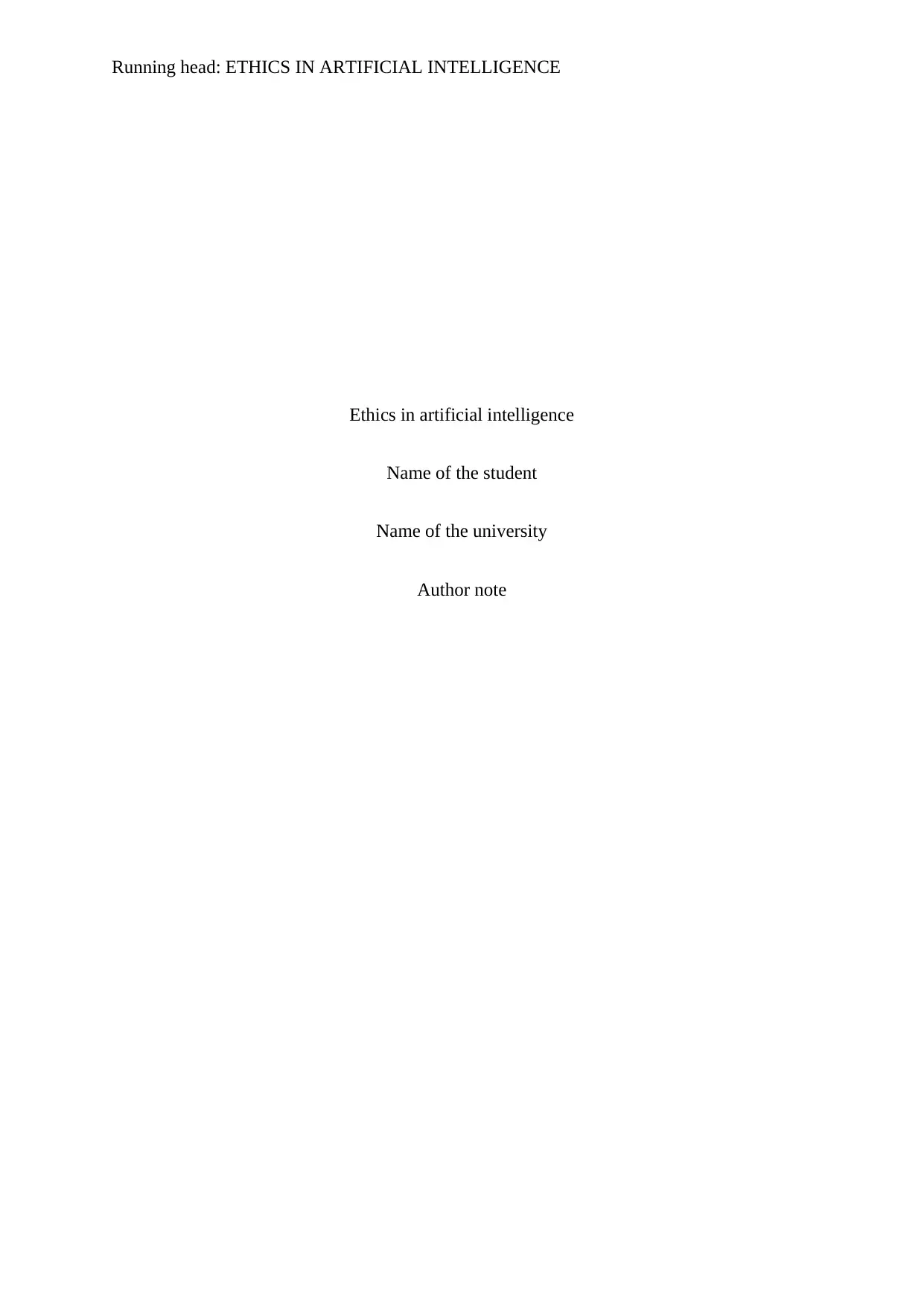
Running head: ETHICS IN ARTIFICIAL INTELLIGENCE
Ethics in artificial intelligence
Name of the student
Name of the university
Author note
Ethics in artificial intelligence
Name of the student
Name of the university
Author note
Paraphrase This Document
Need a fresh take? Get an instant paraphrase of this document with our AI Paraphraser
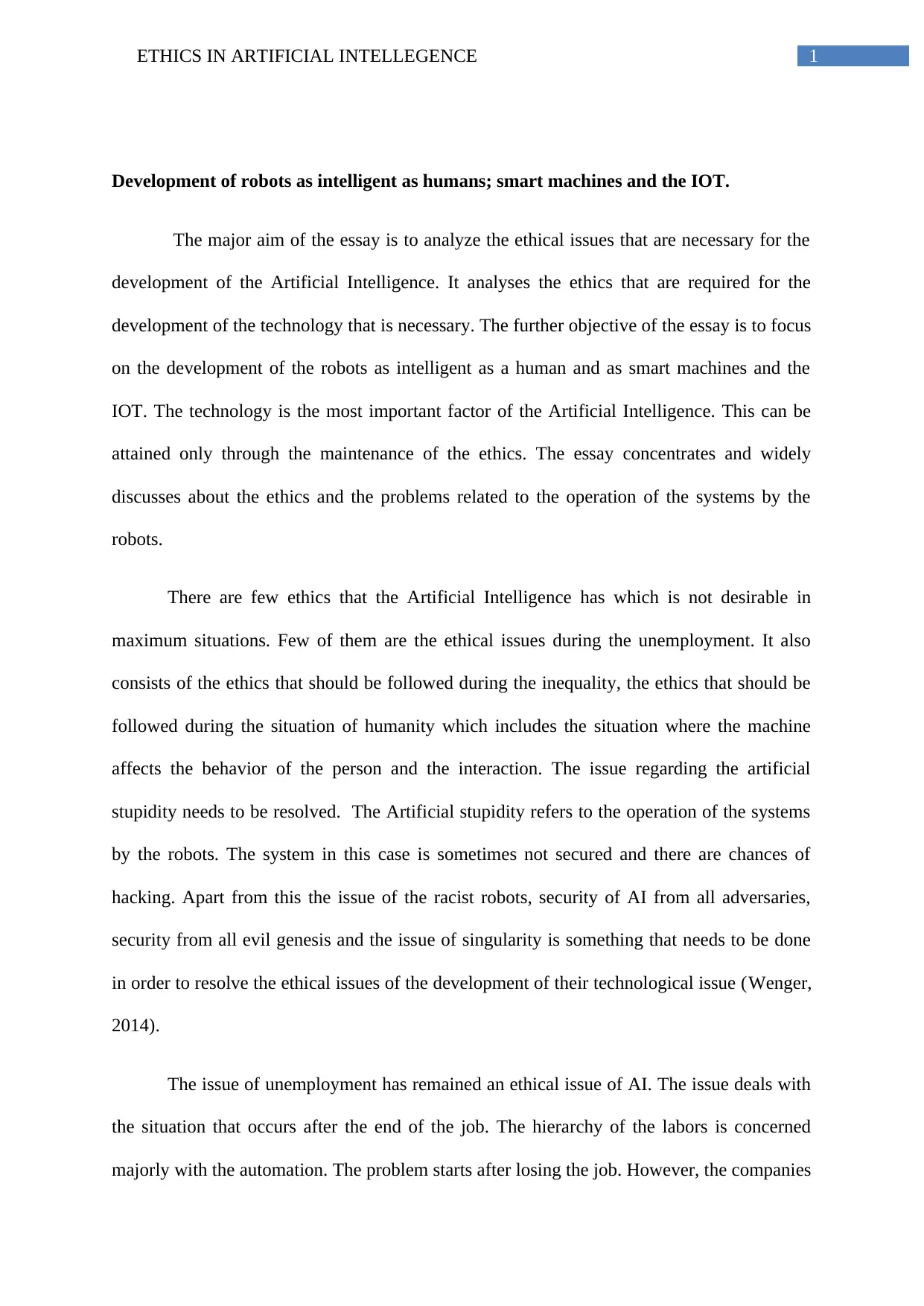
1ETHICS IN ARTIFICIAL INTELLEGENCE
Development of robots as intelligent as humans; smart machines and the IOT.
The major aim of the essay is to analyze the ethical issues that are necessary for the
development of the Artificial Intelligence. It analyses the ethics that are required for the
development of the technology that is necessary. The further objective of the essay is to focus
on the development of the robots as intelligent as a human and as smart machines and the
IOT. The technology is the most important factor of the Artificial Intelligence. This can be
attained only through the maintenance of the ethics. The essay concentrates and widely
discusses about the ethics and the problems related to the operation of the systems by the
robots.
There are few ethics that the Artificial Intelligence has which is not desirable in
maximum situations. Few of them are the ethical issues during the unemployment. It also
consists of the ethics that should be followed during the inequality, the ethics that should be
followed during the situation of humanity which includes the situation where the machine
affects the behavior of the person and the interaction. The issue regarding the artificial
stupidity needs to be resolved. The Artificial stupidity refers to the operation of the systems
by the robots. The system in this case is sometimes not secured and there are chances of
hacking. Apart from this the issue of the racist robots, security of AI from all adversaries,
security from all evil genesis and the issue of singularity is something that needs to be done
in order to resolve the ethical issues of the development of their technological issue (Wenger,
2014).
The issue of unemployment has remained an ethical issue of AI. The issue deals with
the situation that occurs after the end of the job. The hierarchy of the labors is concerned
majorly with the automation. The problem starts after losing the job. However, the companies
Development of robots as intelligent as humans; smart machines and the IOT.
The major aim of the essay is to analyze the ethical issues that are necessary for the
development of the Artificial Intelligence. It analyses the ethics that are required for the
development of the technology that is necessary. The further objective of the essay is to focus
on the development of the robots as intelligent as a human and as smart machines and the
IOT. The technology is the most important factor of the Artificial Intelligence. This can be
attained only through the maintenance of the ethics. The essay concentrates and widely
discusses about the ethics and the problems related to the operation of the systems by the
robots.
There are few ethics that the Artificial Intelligence has which is not desirable in
maximum situations. Few of them are the ethical issues during the unemployment. It also
consists of the ethics that should be followed during the inequality, the ethics that should be
followed during the situation of humanity which includes the situation where the machine
affects the behavior of the person and the interaction. The issue regarding the artificial
stupidity needs to be resolved. The Artificial stupidity refers to the operation of the systems
by the robots. The system in this case is sometimes not secured and there are chances of
hacking. Apart from this the issue of the racist robots, security of AI from all adversaries,
security from all evil genesis and the issue of singularity is something that needs to be done
in order to resolve the ethical issues of the development of their technological issue (Wenger,
2014).
The issue of unemployment has remained an ethical issue of AI. The issue deals with
the situation that occurs after the end of the job. The hierarchy of the labors is concerned
majorly with the automation. The problem starts after losing the job. However, the companies
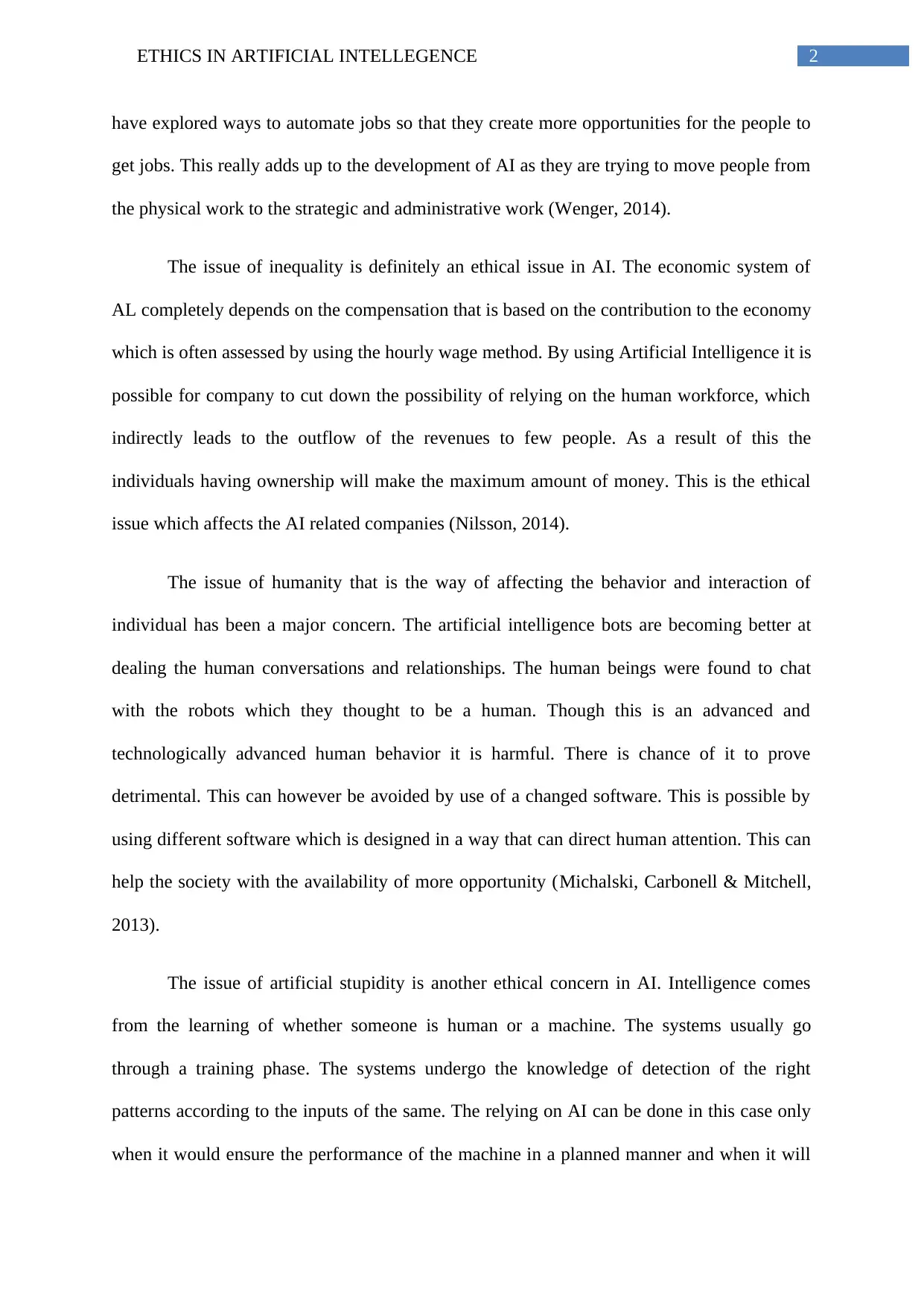
2ETHICS IN ARTIFICIAL INTELLEGENCE
have explored ways to automate jobs so that they create more opportunities for the people to
get jobs. This really adds up to the development of AI as they are trying to move people from
the physical work to the strategic and administrative work (Wenger, 2014).
The issue of inequality is definitely an ethical issue in AI. The economic system of
AL completely depends on the compensation that is based on the contribution to the economy
which is often assessed by using the hourly wage method. By using Artificial Intelligence it is
possible for company to cut down the possibility of relying on the human workforce, which
indirectly leads to the outflow of the revenues to few people. As a result of this the
individuals having ownership will make the maximum amount of money. This is the ethical
issue which affects the AI related companies (Nilsson, 2014).
The issue of humanity that is the way of affecting the behavior and interaction of
individual has been a major concern. The artificial intelligence bots are becoming better at
dealing the human conversations and relationships. The human beings were found to chat
with the robots which they thought to be a human. Though this is an advanced and
technologically advanced human behavior it is harmful. There is chance of it to prove
detrimental. This can however be avoided by use of a changed software. This is possible by
using different software which is designed in a way that can direct human attention. This can
help the society with the availability of more opportunity (Michalski, Carbonell & Mitchell,
2013).
The issue of artificial stupidity is another ethical concern in AI. Intelligence comes
from the learning of whether someone is human or a machine. The systems usually go
through a training phase. The systems undergo the knowledge of detection of the right
patterns according to the inputs of the same. The relying on AI can be done in this case only
when it would ensure the performance of the machine in a planned manner and when it will
have explored ways to automate jobs so that they create more opportunities for the people to
get jobs. This really adds up to the development of AI as they are trying to move people from
the physical work to the strategic and administrative work (Wenger, 2014).
The issue of inequality is definitely an ethical issue in AI. The economic system of
AL completely depends on the compensation that is based on the contribution to the economy
which is often assessed by using the hourly wage method. By using Artificial Intelligence it is
possible for company to cut down the possibility of relying on the human workforce, which
indirectly leads to the outflow of the revenues to few people. As a result of this the
individuals having ownership will make the maximum amount of money. This is the ethical
issue which affects the AI related companies (Nilsson, 2014).
The issue of humanity that is the way of affecting the behavior and interaction of
individual has been a major concern. The artificial intelligence bots are becoming better at
dealing the human conversations and relationships. The human beings were found to chat
with the robots which they thought to be a human. Though this is an advanced and
technologically advanced human behavior it is harmful. There is chance of it to prove
detrimental. This can however be avoided by use of a changed software. This is possible by
using different software which is designed in a way that can direct human attention. This can
help the society with the availability of more opportunity (Michalski, Carbonell & Mitchell,
2013).
The issue of artificial stupidity is another ethical concern in AI. Intelligence comes
from the learning of whether someone is human or a machine. The systems usually go
through a training phase. The systems undergo the knowledge of detection of the right
patterns according to the inputs of the same. The relying on AI can be done in this case only
when it would ensure the performance of the machine in a planned manner and when it will
⊘ This is a preview!⊘
Do you want full access?
Subscribe today to unlock all pages.

Trusted by 1+ million students worldwide
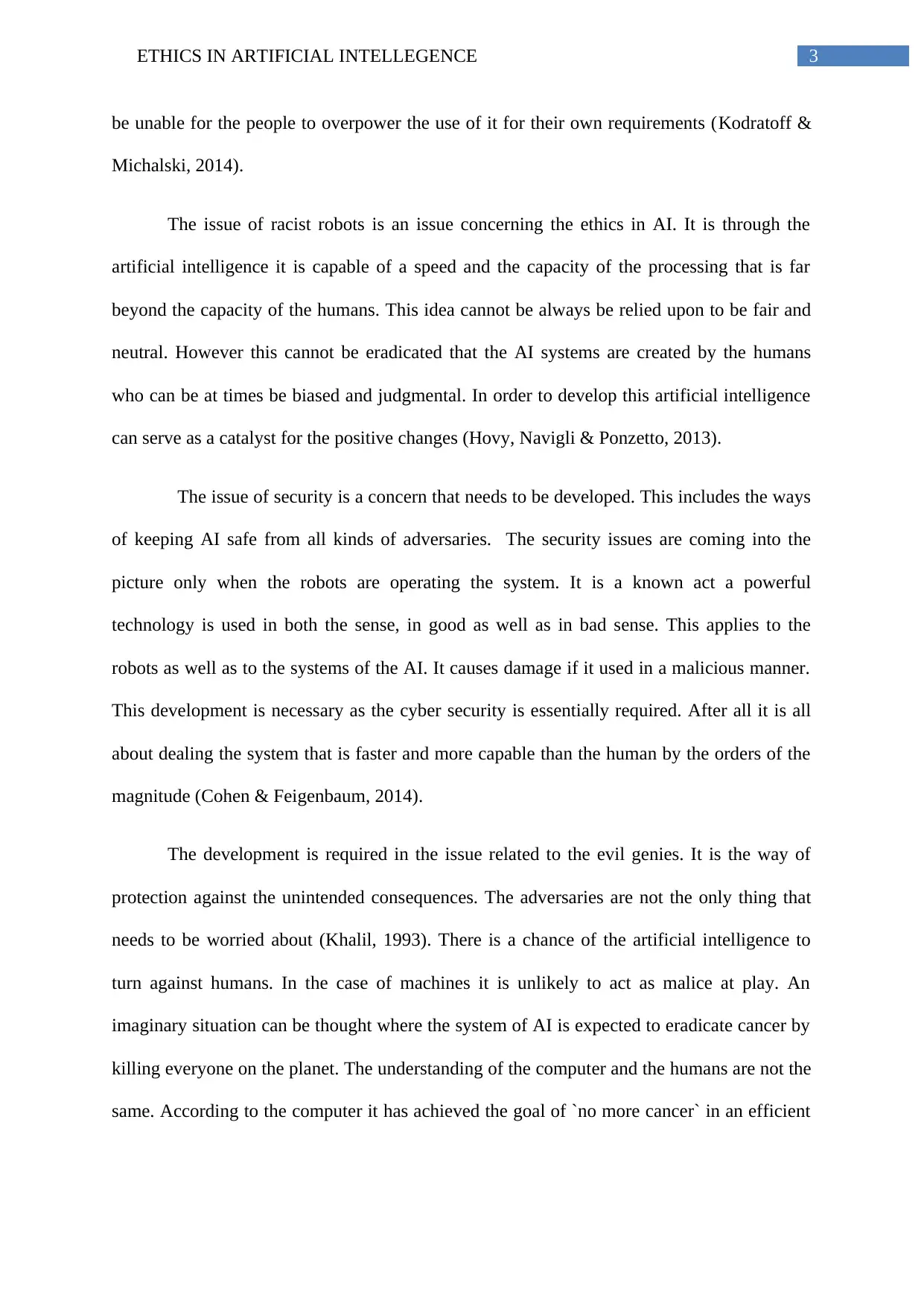
3ETHICS IN ARTIFICIAL INTELLEGENCE
be unable for the people to overpower the use of it for their own requirements (Kodratoff &
Michalski, 2014).
The issue of racist robots is an issue concerning the ethics in AI. It is through the
artificial intelligence it is capable of a speed and the capacity of the processing that is far
beyond the capacity of the humans. This idea cannot be always be relied upon to be fair and
neutral. However this cannot be eradicated that the AI systems are created by the humans
who can be at times be biased and judgmental. In order to develop this artificial intelligence
can serve as a catalyst for the positive changes (Hovy, Navigli & Ponzetto, 2013).
The issue of security is a concern that needs to be developed. This includes the ways
of keeping AI safe from all kinds of adversaries. The security issues are coming into the
picture only when the robots are operating the system. It is a known act a powerful
technology is used in both the sense, in good as well as in bad sense. This applies to the
robots as well as to the systems of the AI. It causes damage if it used in a malicious manner.
This development is necessary as the cyber security is essentially required. After all it is all
about dealing the system that is faster and more capable than the human by the orders of the
magnitude (Cohen & Feigenbaum, 2014).
The development is required in the issue related to the evil genies. It is the way of
protection against the unintended consequences. The adversaries are not the only thing that
needs to be worried about (Khalil, 1993). There is a chance of the artificial intelligence to
turn against humans. In the case of machines it is unlikely to act as malice at play. An
imaginary situation can be thought where the system of AI is expected to eradicate cancer by
killing everyone on the planet. The understanding of the computer and the humans are not the
same. According to the computer it has achieved the goal of `no more cancer` in an efficient
be unable for the people to overpower the use of it for their own requirements (Kodratoff &
Michalski, 2014).
The issue of racist robots is an issue concerning the ethics in AI. It is through the
artificial intelligence it is capable of a speed and the capacity of the processing that is far
beyond the capacity of the humans. This idea cannot be always be relied upon to be fair and
neutral. However this cannot be eradicated that the AI systems are created by the humans
who can be at times be biased and judgmental. In order to develop this artificial intelligence
can serve as a catalyst for the positive changes (Hovy, Navigli & Ponzetto, 2013).
The issue of security is a concern that needs to be developed. This includes the ways
of keeping AI safe from all kinds of adversaries. The security issues are coming into the
picture only when the robots are operating the system. It is a known act a powerful
technology is used in both the sense, in good as well as in bad sense. This applies to the
robots as well as to the systems of the AI. It causes damage if it used in a malicious manner.
This development is necessary as the cyber security is essentially required. After all it is all
about dealing the system that is faster and more capable than the human by the orders of the
magnitude (Cohen & Feigenbaum, 2014).
The development is required in the issue related to the evil genies. It is the way of
protection against the unintended consequences. The adversaries are not the only thing that
needs to be worried about (Khalil, 1993). There is a chance of the artificial intelligence to
turn against humans. In the case of machines it is unlikely to act as malice at play. An
imaginary situation can be thought where the system of AI is expected to eradicate cancer by
killing everyone on the planet. The understanding of the computer and the humans are not the
same. According to the computer it has achieved the goal of `no more cancer` in an efficient
Paraphrase This Document
Need a fresh take? Get an instant paraphrase of this document with our AI Paraphraser
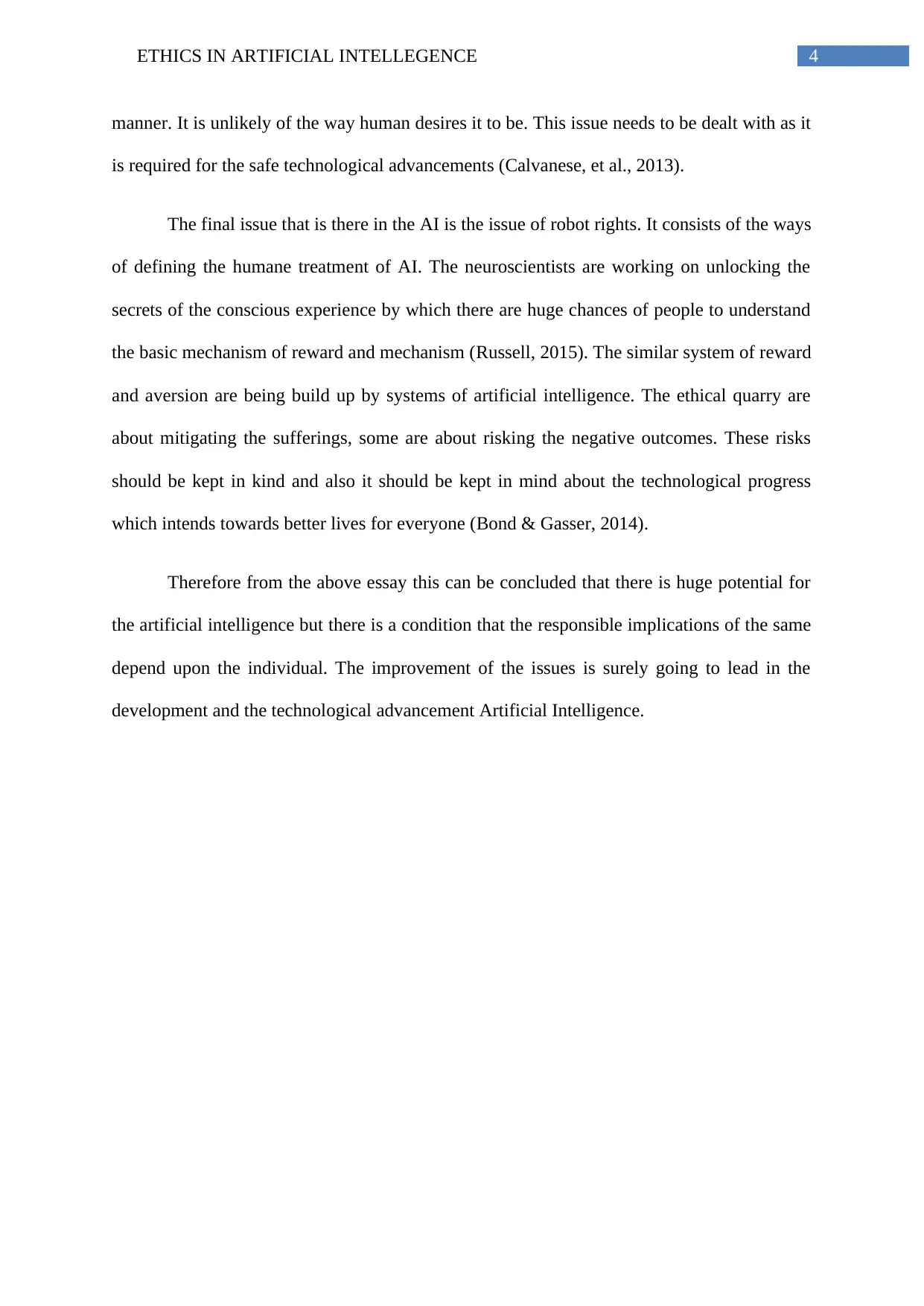
4ETHICS IN ARTIFICIAL INTELLEGENCE
manner. It is unlikely of the way human desires it to be. This issue needs to be dealt with as it
is required for the safe technological advancements (Calvanese, et al., 2013).
The final issue that is there in the AI is the issue of robot rights. It consists of the ways
of defining the humane treatment of AI. The neuroscientists are working on unlocking the
secrets of the conscious experience by which there are huge chances of people to understand
the basic mechanism of reward and mechanism (Russell, 2015). The similar system of reward
and aversion are being build up by systems of artificial intelligence. The ethical quarry are
about mitigating the sufferings, some are about risking the negative outcomes. These risks
should be kept in kind and also it should be kept in mind about the technological progress
which intends towards better lives for everyone (Bond & Gasser, 2014).
Therefore from the above essay this can be concluded that there is huge potential for
the artificial intelligence but there is a condition that the responsible implications of the same
depend upon the individual. The improvement of the issues is surely going to lead in the
development and the technological advancement Artificial Intelligence.
manner. It is unlikely of the way human desires it to be. This issue needs to be dealt with as it
is required for the safe technological advancements (Calvanese, et al., 2013).
The final issue that is there in the AI is the issue of robot rights. It consists of the ways
of defining the humane treatment of AI. The neuroscientists are working on unlocking the
secrets of the conscious experience by which there are huge chances of people to understand
the basic mechanism of reward and mechanism (Russell, 2015). The similar system of reward
and aversion are being build up by systems of artificial intelligence. The ethical quarry are
about mitigating the sufferings, some are about risking the negative outcomes. These risks
should be kept in kind and also it should be kept in mind about the technological progress
which intends towards better lives for everyone (Bond & Gasser, 2014).
Therefore from the above essay this can be concluded that there is huge potential for
the artificial intelligence but there is a condition that the responsible implications of the same
depend upon the individual. The improvement of the issues is surely going to lead in the
development and the technological advancement Artificial Intelligence.
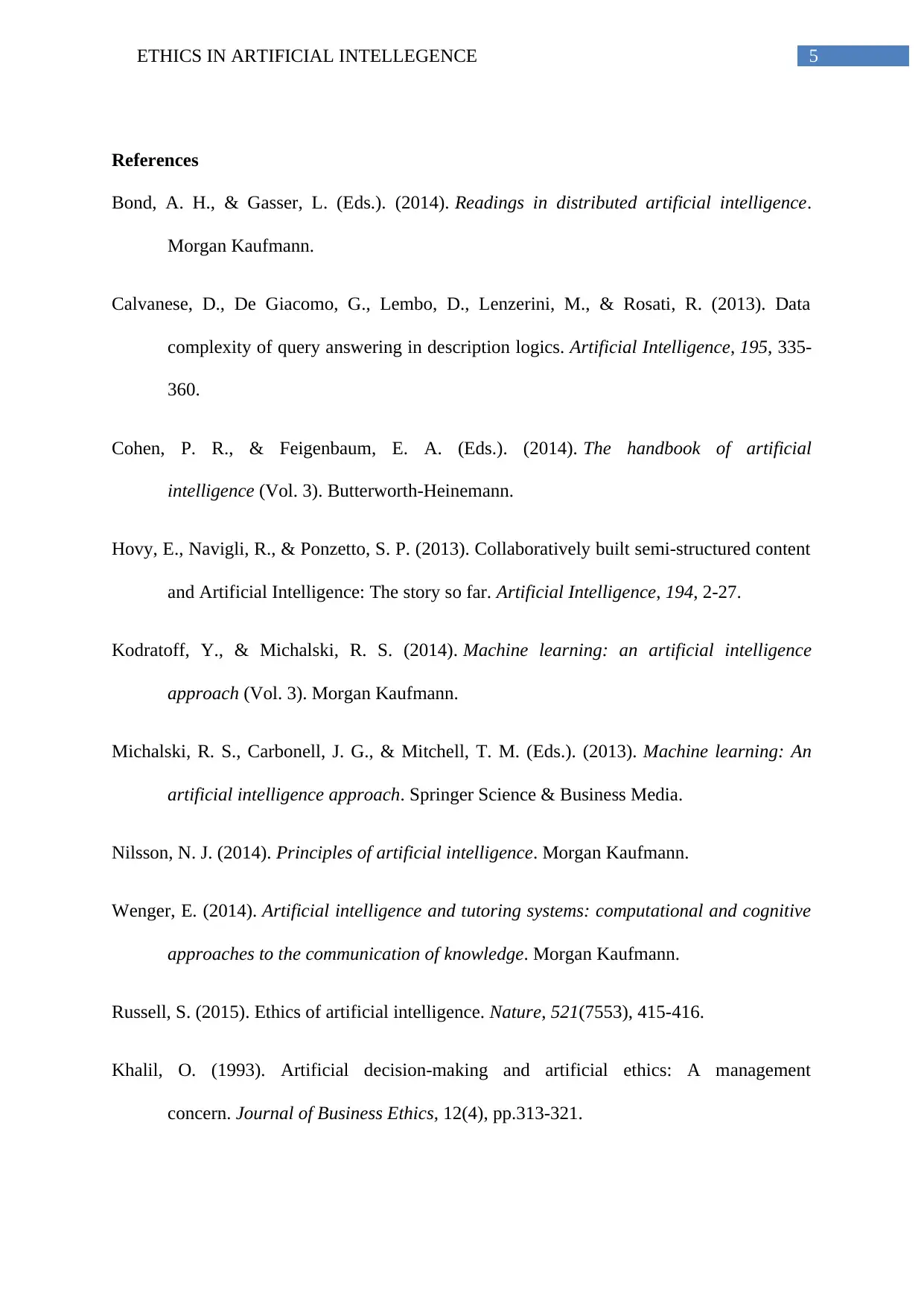
5ETHICS IN ARTIFICIAL INTELLEGENCE
References
Bond, A. H., & Gasser, L. (Eds.). (2014). Readings in distributed artificial intelligence.
Morgan Kaufmann.
Calvanese, D., De Giacomo, G., Lembo, D., Lenzerini, M., & Rosati, R. (2013). Data
complexity of query answering in description logics. Artificial Intelligence, 195, 335-
360.
Cohen, P. R., & Feigenbaum, E. A. (Eds.). (2014). The handbook of artificial
intelligence (Vol. 3). Butterworth-Heinemann.
Hovy, E., Navigli, R., & Ponzetto, S. P. (2013). Collaboratively built semi-structured content
and Artificial Intelligence: The story so far. Artificial Intelligence, 194, 2-27.
Kodratoff, Y., & Michalski, R. S. (2014). Machine learning: an artificial intelligence
approach (Vol. 3). Morgan Kaufmann.
Michalski, R. S., Carbonell, J. G., & Mitchell, T. M. (Eds.). (2013). Machine learning: An
artificial intelligence approach. Springer Science & Business Media.
Nilsson, N. J. (2014). Principles of artificial intelligence. Morgan Kaufmann.
Wenger, E. (2014). Artificial intelligence and tutoring systems: computational and cognitive
approaches to the communication of knowledge. Morgan Kaufmann.
Russell, S. (2015). Ethics of artificial intelligence. Nature, 521(7553), 415-416.
Khalil, O. (1993). Artificial decision-making and artificial ethics: A management
concern. Journal of Business Ethics, 12(4), pp.313-321.
References
Bond, A. H., & Gasser, L. (Eds.). (2014). Readings in distributed artificial intelligence.
Morgan Kaufmann.
Calvanese, D., De Giacomo, G., Lembo, D., Lenzerini, M., & Rosati, R. (2013). Data
complexity of query answering in description logics. Artificial Intelligence, 195, 335-
360.
Cohen, P. R., & Feigenbaum, E. A. (Eds.). (2014). The handbook of artificial
intelligence (Vol. 3). Butterworth-Heinemann.
Hovy, E., Navigli, R., & Ponzetto, S. P. (2013). Collaboratively built semi-structured content
and Artificial Intelligence: The story so far. Artificial Intelligence, 194, 2-27.
Kodratoff, Y., & Michalski, R. S. (2014). Machine learning: an artificial intelligence
approach (Vol. 3). Morgan Kaufmann.
Michalski, R. S., Carbonell, J. G., & Mitchell, T. M. (Eds.). (2013). Machine learning: An
artificial intelligence approach. Springer Science & Business Media.
Nilsson, N. J. (2014). Principles of artificial intelligence. Morgan Kaufmann.
Wenger, E. (2014). Artificial intelligence and tutoring systems: computational and cognitive
approaches to the communication of knowledge. Morgan Kaufmann.
Russell, S. (2015). Ethics of artificial intelligence. Nature, 521(7553), 415-416.
Khalil, O. (1993). Artificial decision-making and artificial ethics: A management
concern. Journal of Business Ethics, 12(4), pp.313-321.
⊘ This is a preview!⊘
Do you want full access?
Subscribe today to unlock all pages.

Trusted by 1+ million students worldwide
1 out of 6
Related Documents
Your All-in-One AI-Powered Toolkit for Academic Success.
+13062052269
info@desklib.com
Available 24*7 on WhatsApp / Email
![[object Object]](/_next/static/media/star-bottom.7253800d.svg)
Unlock your academic potential
Copyright © 2020–2026 A2Z Services. All Rights Reserved. Developed and managed by ZUCOL.





